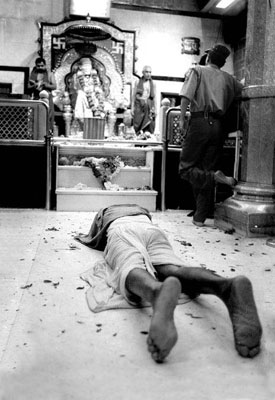
Of the thirty or so devotional songs sung in the aratis, about half were specially composed for Baba and the remainder are traditional arati songs by the medieval poet-saints of Maharashtra. Most of them are in Marathi with a couple each in Hindi and Sanskrit. A small booklet of English transliterations is available; Arati Sai Baba (already mentioned) includes transliterations, full English translations and commentaries.
Arati is held four times a day at Baba's samadhi: at 5 a.m., noon, sunset (around 6.30 p.m.) and at 10 p.m. A siren resounds throughout Shirdi a few minutes before the noon and sunset aratis, and at four o'clock in the morning. The ceremony is broadcast by an amplified system throughout the village. To attend arati it is best to go early and join those waiting in the Queue Complex, where there will be a separate line from the regular darshan queue. If you are too late for this you may be able to enter through the Mukh Darshan entrance, i.e. directly into the mandir at the northeast corner (depending on the number of the people) and attend from the back of the Samadhi Hall. If you are unable to get inside the Samadhi Mandir because of the crowd, you can participate in arati by going next door to Dwarkamai. It was in Dwarkamai that arati was originally performed to Baba and devotees still flock here to join in the worship. Alternatively, you can watch the arati on one of the outside television screens located around the mandir, including one at Gurusthan.
"While singing devotional songs in unison, a devotee can cut across the cussed insulations of the ego and merge easily into the group rhythm. It induces a sense of expanded consciousness in which one tends to lose the individual 'voice'. The sense of being 'apart from the world' is subtly replaced by an awareness of being a part of a 'whole'."
(Sri Babuji)


